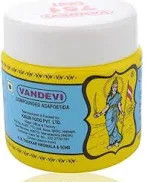Product Overview
Scientific Name(s): Ferula assa-foetida L. (synonym Ferula foetida [Bunge] Regal). Family: Apiaceae (Umbelliferae)
Common Name(s): Asa Foetida , asafetida , asafoetida , devil's dung , gum asafoetida , hing , stinkasant,asfoetida
Other Names: A Wei, Asafétida, Ase Fétide, Assant, Crotte du Diable, Devil's Dung, Ferula Asafoetida, Ferula Assa Foetida, Ferula assa-foetida, Ferula foetida, Ferula pseudalliacea, Ferula rubricaulis, Férule, Férule Persique, Food of the Gods, Fum, Giant Fennel, Heeng, Hing
Asafoetida powder, also known as Hing, is a crucial ingredient in Indian vegetarian cooking.
- Premium Quality Spice also known in India as Hing.
- Asafoetida powder is a crucial ingredient in Indian vegetarian cooking.
- Can be used as a digeestive aid
- Derived from a species of giant fennel, asafoetida has a unique smell and flavor.
- Derived from a species of giant fennel, asafoetida has a unique smell and flavor
Asafetida (sometimes spelled Asafoetida)....A Little History!
Native to Southwestern Asia. A little known spice outside of India, asafetida is the dried resin obtained from the rhizome of the giant fennel plant. Powdered asafetida has a strong odor, reminiscent of picked garlic. In most Indian cooking it is used as a flavor enhancer and once cooked releases an onion-like flavor.
Product Type: Ground Powder Coarse Granules
Derived from a species of giant fennel, asafoetida has a unique smell and flavor. It is called for often in Indian cooking, primarily with legumes and dishes featuring vegetables such as cauliflower. While on its own, the smell may strike you as overpowering and somewhat unpleasant, in cooking it mellows out and produces a flavor similar to onion and garlic. In India this ingredient is crucial for the Jains, who do not eat root crops. Contains asafoetida microfine powder, wheat and rice flour, gum arabic.
Asafoetida is the dried latex (gum oleoresin) exuded from the rhizome or tap root of several species of Ferula, a perennialherb that grows 1 to 1.5 m tall.
Asafoetida is a plant. It has a bad smell and tastes bitter. That probably explains why it is sometimes called “devil’s dung.”
People use asafoetida resin, a gum-like material, as medicine. Asafoetida resin is produced by solidifying juice that comes out of cuts made in the plant’s living roots.
Asafoetida is used for breathing problems including ongoing (chronic) bronchitis,H1N1 "swine" flu, and asthma. It is also used for digestion problems including intestinal gas, upset stomach, irritable bowel syndrome (IBS), and irritable colon. Other uses include treatment of “whooping cough” (pertussis), croup, and hoarse throat.
Some people use asafoetida for hysteria, insanity, convulsions, and as a nerve stimulant for ongoing mental and physical fatigue with depression (neurasthenia).
Women sometimes use asafoetida to restart their menstrual periods aftermenstruation has stopped for some reason.
Asafoetida is sometimes applied directly to the skin for corns and calluses.
Uses of Asafetida
The gum resin asafetida is used as a flavoring, food preservative, and fragrance. It is used as a folk remedy for a wide variety of purposes, including carminative, antispasmodic, expectorant, sedative diuretic, anthelminthic, aphrodisiac, and emmenagogue. Antiviral activity has been demonstrated in vitro against the influenza A virus (H1N1). There is no clinical evidence to support therapeutic claims.
There is some scientific evidence that the chemicals in asafoetida might help treat irritable bowel syndrome (IBS), and also might protect against high blood levels of certain fats including cholesterol and triglycerides. Chemicals called coumarins in asafoetida can thin the blood.
- This spice is featured by Dr. Oz for a slew of great holistic benefits! http://www.doctoroz.com/videos/ayurvedic-secrets-weight-loss
- You'll LOVE our Asafetida by Rani Brand®--Here's Why: 100% Natural, No preservatives & Great Health Benefits... often used as a Garlic/Onion substitute, also in dal (soups) to offset/help digest beans & lentils
RECIPE:
Lentil curry Cook time: 45 minutes Prep time: 30 minutes
Serving size: 4 Heat level: Mild
2 cups Rani Toor dal
1 tsp. Rani Turmeric ground
1 tsp. Rani Cumin seeds
1 tsp. Rani Asafetida ground
salt to taste
Method: Soak Toor dal for 30 min. and drain. Cook the toor dal in 3 ½ cups of hot water until soft. Add the turmeric, cumin seed, asafetida, and salt. Simmer for 5 min.









